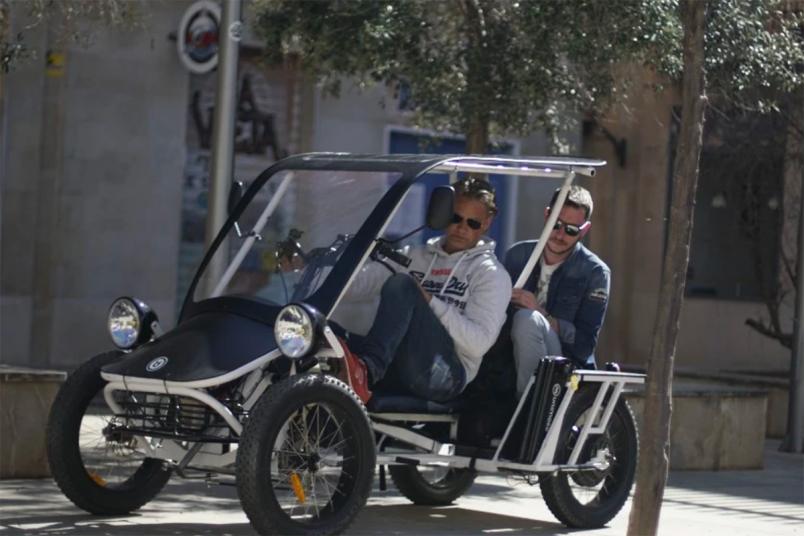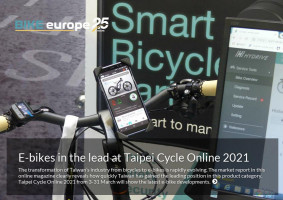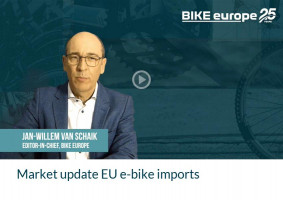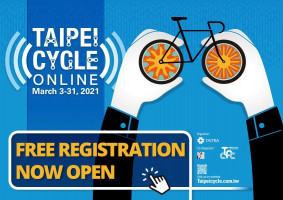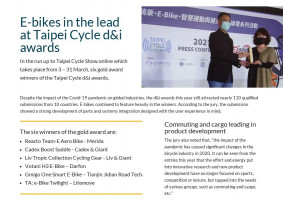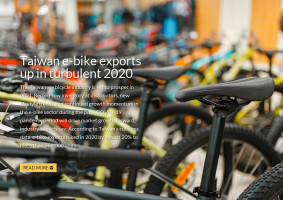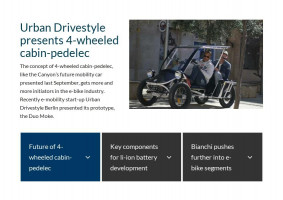Future of 4-wheeled cabin-pedelec
“The company Urban Drivestyle says the prototype is “the world’s first and only 20×4 inch fat-wheel cab bike.” So far, the young Berliners have made a name for themselves with their unusual e-bikes and e-step-scooters, whose look is somewhere between BMX and stingray bikes. What distinguishes all of Urban Drivestyle’s pedelecs to date, however, is the use of fat tires.
Legally, the up-to-25 km/h pedelec is also a multi-track bicycle that requires neither insurance nor a driver’s license, similar to the four-wheeled ‘Future Mobility Concept’ unveiled by Canyon Bicycles in September 2020. Moreover, you can use it legally on bike paths.
“The Duo Moke has everything our other e-bikes have – plus extra safety and extra stability with four 20 x 4 inch all-terrain tires at once,” the company explained in a statement. “The Duo Moke also gives you extra seating comfort from a horizontal riding position. The windbreak in the front and a roof equipped with solar cells offers extra protection in wind and rain. It is almost like a car, but exactly the same advantages of an e-bike. You can get through narrow streets, you ride on bike paths, and you don’t pay any extra costs like you do with a car,” the company explains. The prototype can either carry 2 passengers behind the rider or use the space to carry cargo.
Whether the prototype, which was presented at the beginning of November 2020, will actually go into series production at some point is still unclear. What is surprising, however, is that Urban Drivestyle communicates a vague retail price of around €5,000. Considering the equipment and the focus on “Made in Germany and the EU,” this will certainly be a real challenge for the Berlin-based company..
Key components for lithium-ion battery development
The future battery market will be disrupted by the growing popularity of e-bikes in combination with the electrification of all other means of mobility, like cars, light vehicles and even trucks. Battery manufacturers therefore need to strengthen their energy planning and construction capacity. To quickly meet the rising demand, more large-scale battery manufacturing sites with 50 GWh capacity have to be established.
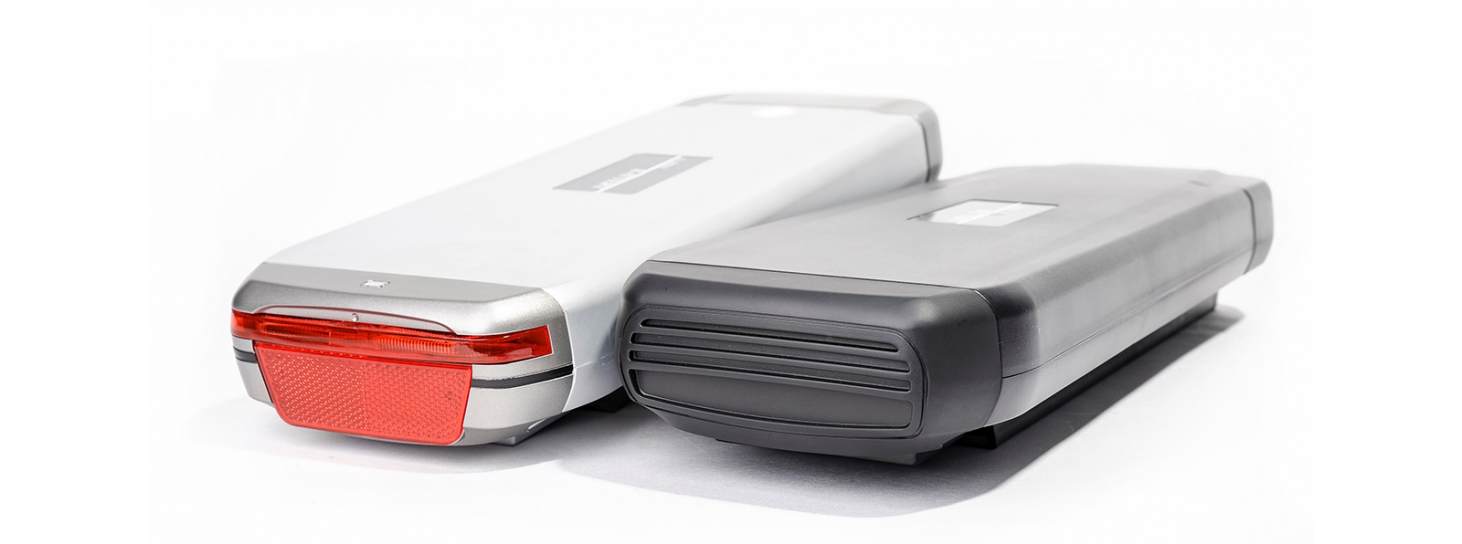
This was stated by battery manufacturer Phylion, based on the information of the China Automotive Technology and Research Center. “The technology for lithium-ion batteries is developing quickly and we see a more widespread use in mobility,” Phylion writes in a company statement. “The weight and performance of these electric vehicles is also increasing which makes the development and design of batteries more complicated.”
For light vehicles, the core materials, battery management system (BMS) and pack design are three crucial factors that determine the quality of lithium-ion power batteries. The cathode material is the decisive factor of the electric performance of the battery. At present, there are three main materials which been commonly used: LMO (Lithium Manganese Oxide), LFP (Lithium Iron Phosphate) and NCM (Nickel Manganese Cobalt).
Battery manufacturer Phylion compares the use of these three materials.
Taking NCM as cathode material has many potential problems, such as high safety hazard and poor power performance. Taking LFP as cathode material has the problem of poor performance under low temperature and low specific energy. The lithium-ion battery with LMO as cathode material has the advantages of high safety, long cycle life, secondary life and high-cost performance which makes it the most suitable material system for LEVs.
A good battery management system (BMS) design ensures the safe use of lithium-ion batteries. Crucial elements like over-discharge protection, over-current protection, temperature control and charger identification determine the quality of the BMS.
Bianchi pushes further into e-bike segments with new E-Omnia range
Bianchi has extended its Lif-e Electric Intelligence Program with the new E-Omnia e-bike platform covering city, tourer and mountain bike types. The Italian high-performance brand, generally known for their sports bikes only, has unveiled eight models across the three different types in what it calls “a significant step forwards in the electric revolution.”
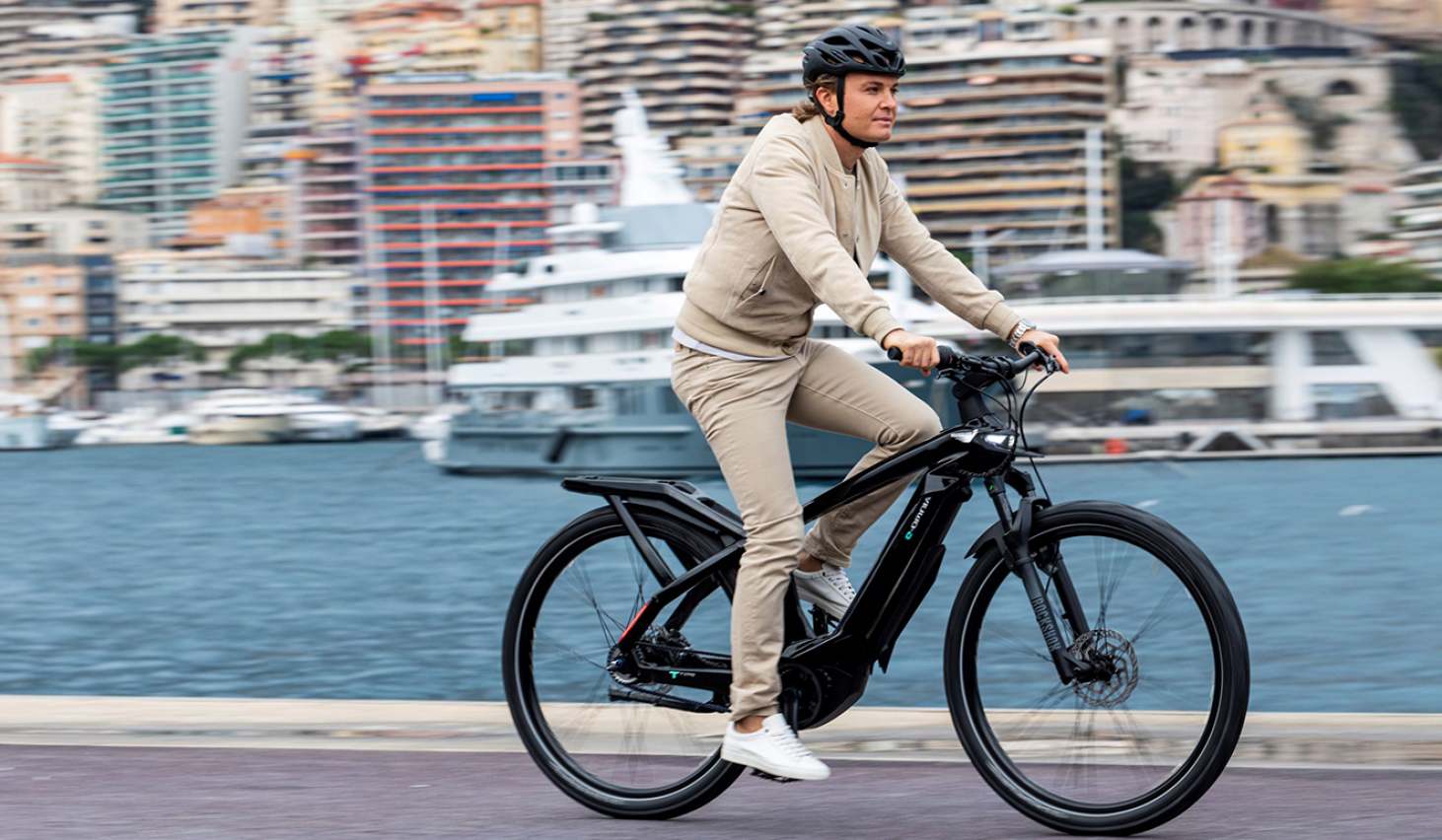
What started with Bianchi’s flagship full-carbon electric model e-SUV, has now been extended to a range of performance aluminium e-bikes for all riders. “With the aim of shaping a new way of moving, Bianchi is launching a new platform of high-performance e-bikes to meet the needs of every type of rider, from trekkers, travellers and tourists, to urban explorers, commuters and experienced mountain bike riders,” the company said in a launch statement.
The E-Omnia range will be made up of the C-Type, for city riding, the T-Type a versatile full suspension tourer bike (including men’ and women’s versions, and a full suspension model FT-Type) and the X-Type a hardtail e-MTB, including a full suspension model named FX-Type.
“The ‘omnia’ in its name – it means ‘everything’ in Latin – which mirrors the ambition of Bianchi Lif-e Electric Intelligence program’s latest platform: to be your perfect e-bike, the bike for every kind of rider,” Bianchi’s CEO Fabrizio Scalzotto said during the launch. 3D online configurator
Each individual can create their own E-Omnia that is suited to their needs in the newly developed configurator. “With a rider-first approach, placing the user closer to Bianchi’s development process than ever before, Bianchi has created the most advanced 3D online bike configurator in the world with, 8,500 possible combinations of colours, features and specifications,” explained marketing manager, Claudio Masnata.
